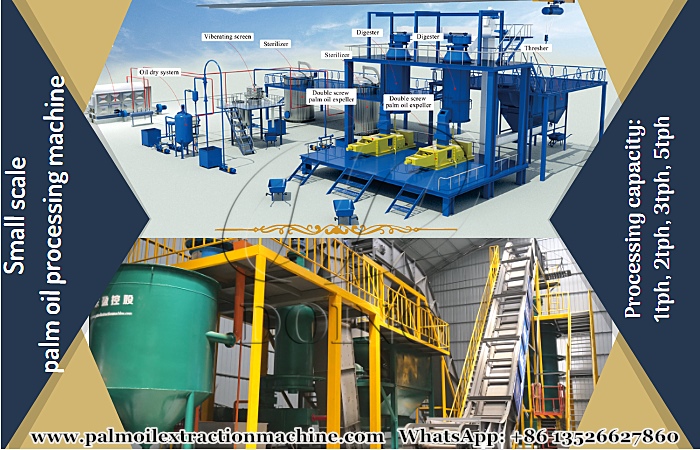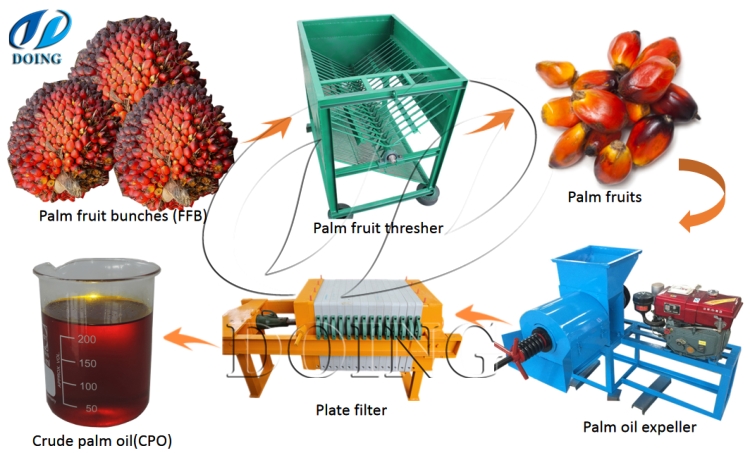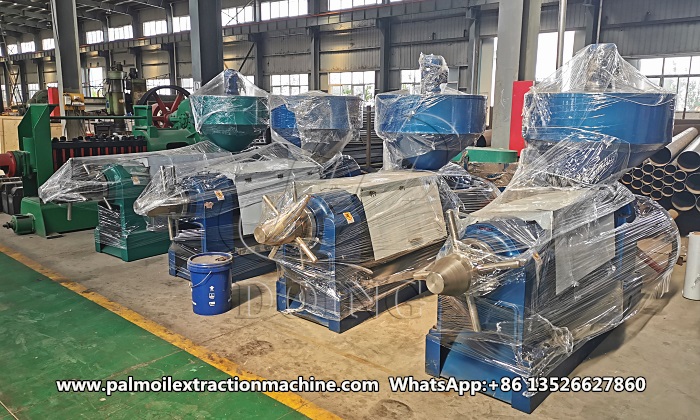- We are a manufacturer of oil press equipment and grain and oil processing equipment.
- Email:2334065214@qq.com
The core process of palm kernel oil processing includes killing fermentation, de-fruiting, pressing, refining and so on, while roasting is a key step to improve the flavor and quality of the oil, and its equipment selection directly affects the market competitiveness of the final product. This paper combines the characteristics of palm kernel oil processing and industry practice experience to provide systematic suggestions on roaster selection from the three dimensions of production scale, equipment performance and process suitability.

I. Equipment matching strategy based on production scale
Small-scale processing scenarios
For plantations or family workshops with a processing capacity of less than 1 ton/hour, it is recommended to choose 500kg/h single screw oil presses with small roasters. This kind of equipment has a small footprint and low cost (about RMB 6,650/unit), and supports dual power sources of diesel engine or electric motor, which is suitable for scenarios with scattered raw materials and low processing frequency. For example, the 500kg/h single screw model introduced by Guorui Oil & Grease has a press screw made of 2CR13 high-strength wear-resistant alloy steel, which has a long service life and is suitable for small-scale processors who are investing for the first time.
Medium-sized industrialized production
Factories with a processing capacity of 1-15 tons/hour need to consider a double screw press + automated roasting line. The double screw model (such as 1TPH, 5TPH) works with the hydraulic pump station through the tail gear box, which has high oil output efficiency and is not easy to be clogged. For example, Guorui oil and grease’s 1t/h double screw model supports hydraulic system control, can operate continuously and the residual oil rate is as low as 4%, which is suitable for forming a standardized production line with leavening tanks, fruit removal machines, plate and frame filters, etc., with an investment cost of about RMB 300,000-1,000,000 yuan.
Large-scale production
Enterprises with a processing capacity of 15 tons/hour or more need to deploy a fully automated roasting production line, covering leavening, de-fruiting, mashing, pressing, filtration, drying and palm kernel recovery. For example, Guorui Oil’s 200t/d refining equipment adopts a combination of physical and chemical refining technology, which can significantly improve the stability of fats and oils through the processes of hydrochemical degumming, alkaline refining and deacidification, decolorization, and high temperature deodorization, etc. The investment of this kind of production line usually exceeds RMB 10 million. The investment of this kind of production line usually exceeds 1 million yuan, but it can realize the mass production of high value-added products (such as palm kernel oil with strong frying stability).

Second, the core technical indicators of roaster performance
Thermal efficiency and temperature control
Palm kernel roasting requires precise temperature control (120-180 ℃) to avoid scorching. High quality roasters should have segmented temperature control function, such as direct fire or semi-hot air heating system, the former is suitable for the pursuit of rich aroma scenarios, while the latter can retain more natural flavors. The equipment needs to be able to finish French roasting in less than 20 minutes and maintain a stable fire at 70% of the maximum ingredient handling capacity.
Smoke extraction and flavor management
The smoke generated during the roasting process directly affects the aroma of the fat. The equipment needs to be equipped with an efficient smoke extraction system to ensure that the smoke can be freely controlled and to avoid residual smoke flavor. For example, Guorui Fats’ production line uses centrifugal separation technology to reduce colloidal substances such as phospholipids, which reduces the difficulty of subsequent deodorization, while retaining nutrients such as Vitamin E.
Durability and Maintenance Costs
High-strength wear-resistant materials (e.g., 2CR13 alloy steel) extend the life of the press screw and reduce downtime for maintenance. Hydraulic system-controlled models (e.g., 1-ton/hour twin-screw models) increase force by varying pressure, reducing failure rates. In addition, the equipment needs to support a modular design for quick replacement of wear parts.

Process adaptability and value-added space
Adaptation of raw material characteristics
The moisture content of palm kernel fluctuates greatly, so it is necessary to choose roasters with strong adaptability to raw materials. For example, Guorui Oil’s double-screw model has no special requirements on raw material moisture content, which is suitable for continuous production under high humidity environment in tropical areas.
Linkage of refining process
After roasting, palm kernel needs to be linked with refining equipment. Physical refining separates free fatty acids through high temperature and low pressure, which is suitable for retaining natural flavor; chemical refining reduces acid value through alkali neutralization, which is suitable for producing highly stable fats and oils. Companies need to choose the process route according to the target market (e.g. food processing, cosmetic ingredients).
Capacity Expansion Potential
Initial investment should leave room for upgrading. For example, single-screw models can be expanded to double-screw models, or automation can be enhanced by adding equipment such as rotary vibrating screens and plate and frame filters. Manufacturers such as Guorui Oil & Grease provide customized services to support the adjustment of production line configuration according to actual demand.
Market Cases and Cost-benefit Analysis
Small Plantation Case: A plantation in Southeast Asia adopts 500kg/h single screw machine + simple roasting equipment, with an investment of about 100,000 RMB, and processes 1,200 tons of palm fruits annually, producing 240 tons of gross palm kernel oil, with a profit margin of 25%.
Case of medium-sized factory: an enterprise in Africa introduced 1 ton/hour double screw production line with automated roasting system, with an investment of RMB 800,000, annual processing capacity of 30,000 tons, output of 6,000 tons of refined palm kernel oil, and product premium of 15%.
Case of large group: a group in Malaysia deployed a 200 tons/day refining line with an investment of RMB 12 million to produce high-end frying oil through physical refining technology, with an annual sales of over RMB 200 million.
Conclusion
The selection of roasters for palm kernel oil processing line needs to take into account the production scale, equipment performance and process suitability. Small-scale scenarios give priority to low-cost, highly flexible single-screw models; medium-sized factories should focus on line automation and oil efficiency; large enterprises need to lay out the whole industry chain and enhance the added value of products through refining technology. It is recommended that enterprises choose suppliers with customization capability (such as Guorui Oil, Penguin Grain & Oil Machinery) according to actual demand, and reserve space for capacity expansion to cope with market changes.
gao
Henan Zhongrui Grain is a high-tech enterprise specializing in the research, development, manufacture and sales of oil press equipment, and has been deeply engaged in the field of oil processing for more than ten years. The company integrates design, production and testing, and its products cover screw oil press, hydraulic oil press, automatic refining production line, etc., which are suitable for rapeseed, peanut, soybean, sesame and other oilseeds, and help customers to realize efficient, energy-saving and environmentally friendly oil and grease production.
Contact Us
Product Center
menu
Recommended
© 2025. All Rights Reserved. 豫ICP备19039166号 Theme By XinTheme












